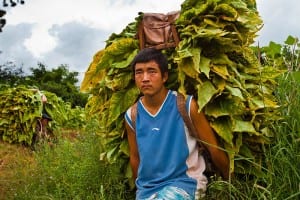December 10th is recognized worldwide as Human Rights Day. It commemorates the anniversary of the day that the United Nations General Assembly adopted the Universal Declaration of Human Rights (UDHR) in 1948. The UDHR and other human rights treaties, both international and regional, protect myriad rights around the world, including the rights of women and children, and the right to life and health.
People don’t often think of tobacco as a human rights issue, but they should.
When people do think of tobacco as a human rights issue, the plight of tobacco farm workers often comes to mind first. Tobacco workers – often children – are exposed to nicotine and dangerous pesticides, and often work in deplorable conditions. Changes need to be made.
However, tobacco farming is not the only connection between tobacco and human rights.

ASH is investigating the possibility of holding tobacco corporations responsible for tobacco-related deaths under human rights laws. These charges – for example, a violation of the right to life or right to health, among many others – would be levied against governments for not protecting their citizens from Big Tobacco.
There are several options for utilizing human rights laws to enforce tobacco control.
Some legal systems have mechanisms to hold the government and corporations responsible. In other systems, a human rights case would be directed solely against a government, but then that government would be required (or in some cases, recommended) to implement and enforce tobacco control laws within their countries, for example, by implementing the WHO Framework Convention on Tobacco Control (FCTC).
One option is pursuing a case under a regional human rights treaty, like in the Inter-American system, European system, or African system. You can read more about a potential case in the Inter-American system here>. Other options include pursuing recommendations from other international treaty bodies, such as the Committee on Economic, Social, and Cultural Rights, or pursuing a human rights case in a country that incorporates treaty obligations into its national constitution. There are many paths to choose from, but all of them require that tobacco be treated as a human rights issue.

Here at ASH, we share the wish of Former United Nations Secretary-General, Kofi Annan- “It is my aspiration that health finally will be seen not as a blessing to be wished for, but as a human right to be fought for.” With our tobacco and human rights program, we are working to ensure that life, free from the death and diseases caused by tobacco, is a human right that can, and will be, fought for.
Read more about our human rights program here>.
Join the conversation about human rights on twitter with #HumanRightsDay and make sure to tag @ASHOrg.